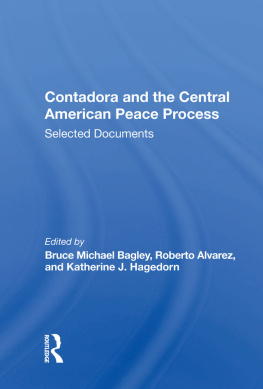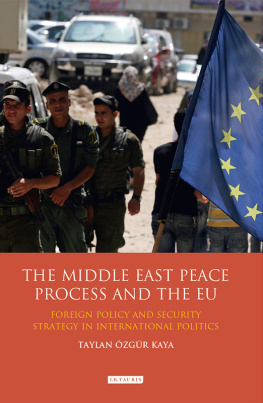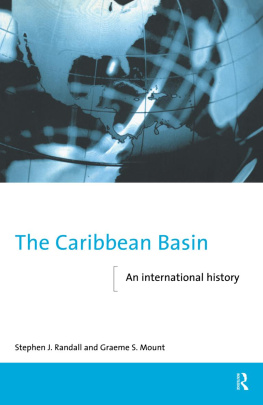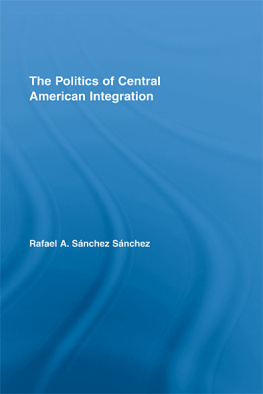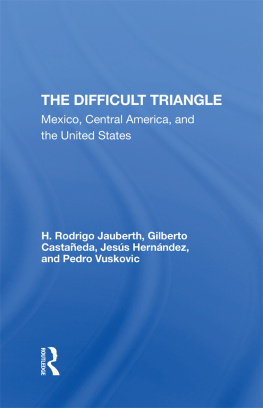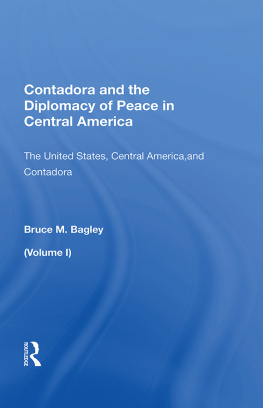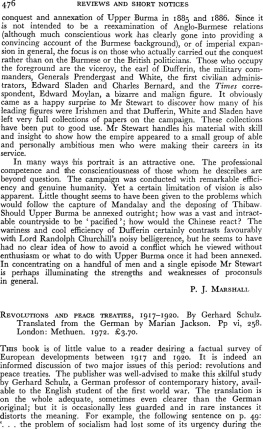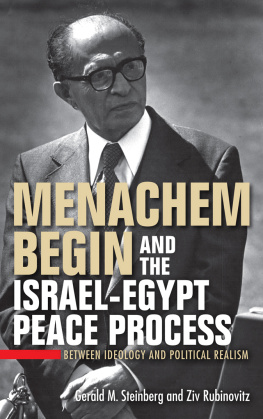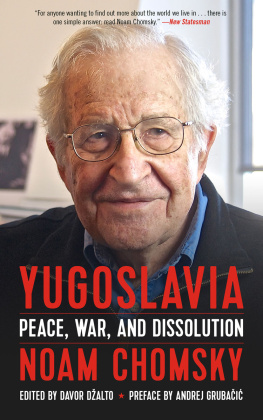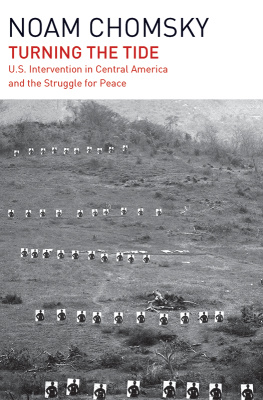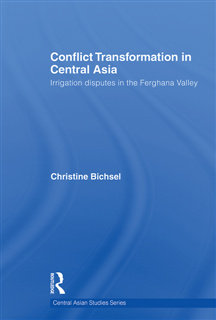Contadora and the Central American Peace Process
The Johns Hopkins Foreign Policy Institute
Harold Brown
Chairman
Simon Serfaty
Executive Director
Philip Geyelin
Editor-in-Residence
Robert E. Osgood
Director of Research Codirector, Security Studies Program (on leave)
Michael Vlahos
Codirector Security Studies Program
Archie Albright
Executive-in-Residence
Kristen E. Carpenter
Managing Editor Publications Program
Wilfrid Kohl
Director International Energy Program
George R. Packard
Dean, School of Advanced International Studies, The Johns Hopkins University
The Johns Hopkins Foreign Policy Institute (FPI) was founded in 1980 and serves as the research center for the School of Advanced International Studies (SAIS) in Washington, D.C. The FPI is a meeting place for SAIS faculty members and students, as well as for government analysts, policymakers, diplomats, journalists, business leaders, and other specialists in international affairs. In addition to conducting research on various policy-related international issues, the FPI sponsors conferences, seminars, and roundtables.
The FPI's research activities are often carried out in conjunction with SAIS's regional and functional programs dealing with American foreign policy, Latin America and the Caribbean Basin, Africa, the Middle East, the Soviet Union, U.S.-Japan relations, Canada, the Far East, Europe, security studies, international energy, and international economics.
FPI publications include the SAIS Review, a biannual journal of foreign affairs, which is edited by SAIS students; the SAIS Papers in International Affairs, a monograph series which is copublished with Westview Press in Boulder, Colorado; and, the FPI Policy Study Briefe, a series of analyses of foreign policy issues as they develop. For additional information regarding FPI publications, write to: FPI Publications Program, School of Advanced International Studies, The Johns Hopkins University, 1740 Massachusetts Avenue, N.W. Washington, D.C. 20036.
About the Book and Editors
The political, economic, and social problems of Central America during the past four years have at times threatened to escalate into a generalized conflict. Intense diplomatic efforts to find peaceful solutions to the crisis, however, have met with only limited success. Negotiations have collapsed amid bitter accusations of intransigence or bad faith, and some have taken place outside of public scrutiny, resulting in widespread confusion that has surrounded the entire peace process. This book is an effort by the Central American and Caribbean Program at the School of Advanced International Studies to shed light on the crucial roles of the Contadora Group (Colombia, Mexico, Panama, and Venezuela) in forging peace in the region. Containing a collection of nearly one hundred statements, declarations, proposals, resolutions, draft treaties, and official documents, it easily constitutes the most comprehensive reference work on the search for peace in Central America. In order to improve readability, slight adjustments have been made to some of the documents.
Bruce Michael Bagley is associate professor of comparative politics and Latin American studies at the School of Advanced International Studies, The Johns Hopkins University. Roberto Alvarez is a program associate of the Central American and Caribbean Program, the School of Advanced International Studies. Katherine J. Hagedorn is managing editor of SAIS Review.
SAIS PAPERS IN INTERNATIONAL AFFAIRS NUMBER 8
Contadora and the Central American Peace Process
Selected Documents
Central American and Caribbean Program
Bruce Michael Bagley, Roberto Alvarez, and Katherine J. Hagedorn, Editors
First published 1985 by Westview Press, Inc.
Published 2018 by Routledge
52 Vanderbilt Avenue, New York, NY 10017
2 Park Square, Milton Park, Abingdon, Oxon OX14 4RN
Routledge is an imprint of the Taylor & Francis Group, an informa business
Copyright 1985 by The Johns Hopkins Foreign Policy Institute, School of Advanced International Studies (SAIS)
All rights reserved. No part of this book may be reprinted or reproduced or utilised in any form or by any electronic, mechanical, or other means, now known or hereafter invented, including photocopying and recording, or in any information storage or retrieval system, without permission in writing from the publishers.
Notice:
Product or corporate names may be trademarks or registered trademarks, and are used only for identification and explanation without intent to infringe.
Library of Congress Cataloging-in-Publication Data
Main entry under title:
Contadora and the Central American peace process.
(SAIS papers in international affairs; #8)
1. Central AmericaPolitics and government 1979- Sources. 2. Grupo de Contadora. 3. Peace. I. Bagley, Bruce Michael. II. Alvarez, Roberto. III. Hagedorn, Katherine J. IV. Series: SAIS papers in international affairs; no. 8.
F1439.5.C67 1985 972.8'052 85-13609
ISBN 13: 978-0-367-00541-2 (hbk)
- ARDE Alianza Revolucionaria Democrtica (Nicaragua)
- FDN Fuerza Democratica Nicaragense (Nicaragua)
- FDR-FMLN Frente Democrtico Revolucionario-Frente Farabundo Mart para la Liberacin Nacional (El Salvador)
- FSLN Frente Sandinista de Liberaci Nacional (Nicaragua)
- GNR Goverment of National Reconstruction (Nicaragua)
- IAA Inter-American Affairs
- NDC Nicaraguan Development Council
- OAS Organization of American States
- UDN-FARN Unin Democrtica Nicaragense-Fuerzas Armadas Revolucionaries Nicaraguenses
- UN United Nation
- US United States
In January 1984, I returned to SAIS after a yearlong leave of absence which I spent doing research on Colombia. While in Colombia during 1983 I was able to observe firsthand the increasingly independent role in hemispheric affairs adopted by the newly-elected administration of President Belisario Betancur. One of the centerpieces of Betancur's new foreign policy was his government's decision to join with Mexico, Venezuela, and Panama on Contadora Island on January 8 and 9, 1983, to seek a negotiated peace for the conflicts in Central America.
While in Colombia I had been unable to obtain many of the Contadora documents released during 1983. I was nevertheless confident that I could acquire them with relative ease once back in Washington, D.C. Much to my dismay, however, when I returned to SAIS, I found that nowhere in the nation's capital, nor among my friends and colleagues around the country, was it possible for me to gain access to the complete collection of Contadora documents, much less the reactions to them by key actors in the region or abroad.
My original shock over my inability to obtain these documents in Washington, easily or not, was soon overshadowed by my growing realization that if I was having such a hard time, it was extremely unlikely that many in the Washington policy community were actually reading Contadora's declarations and proposals carefully or following the negotiation process closely. In fact, the debates over Central America and the Contadora Group's peace proposals that had flared up in the U.S. Congress and between Congress and the Reagan administration in 1983 and early 1984 were based primarily on journalistic reports rather than on a thorough knowledge of the documents themselves (many of which were available only in Spanish).

